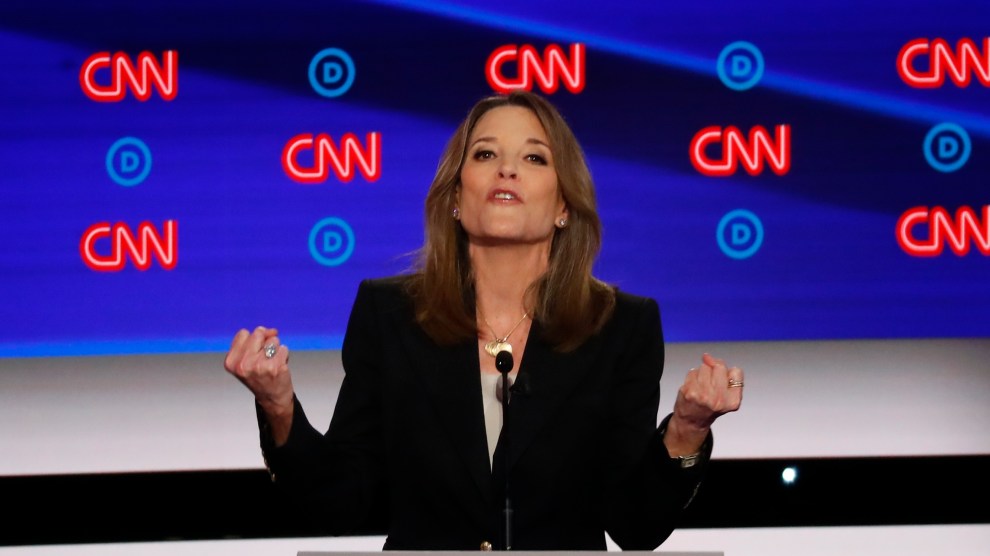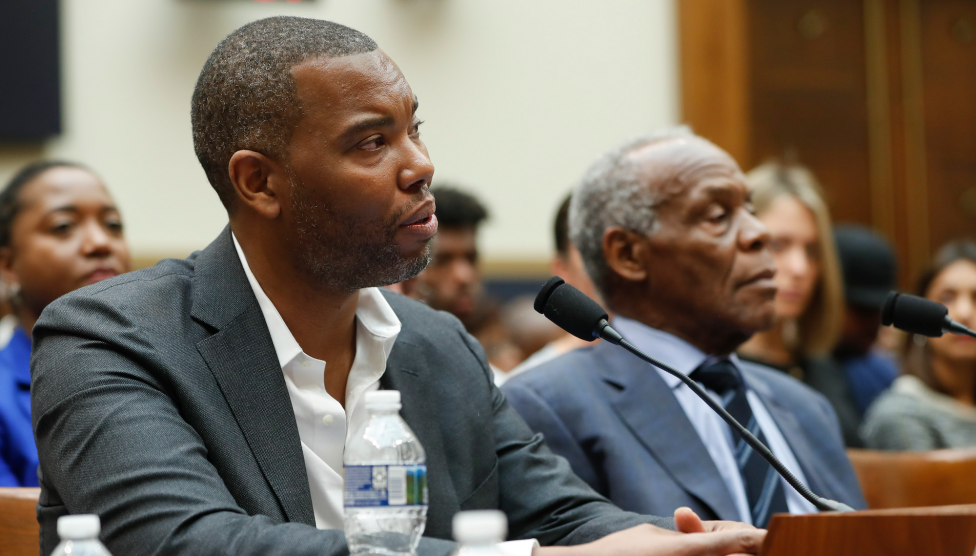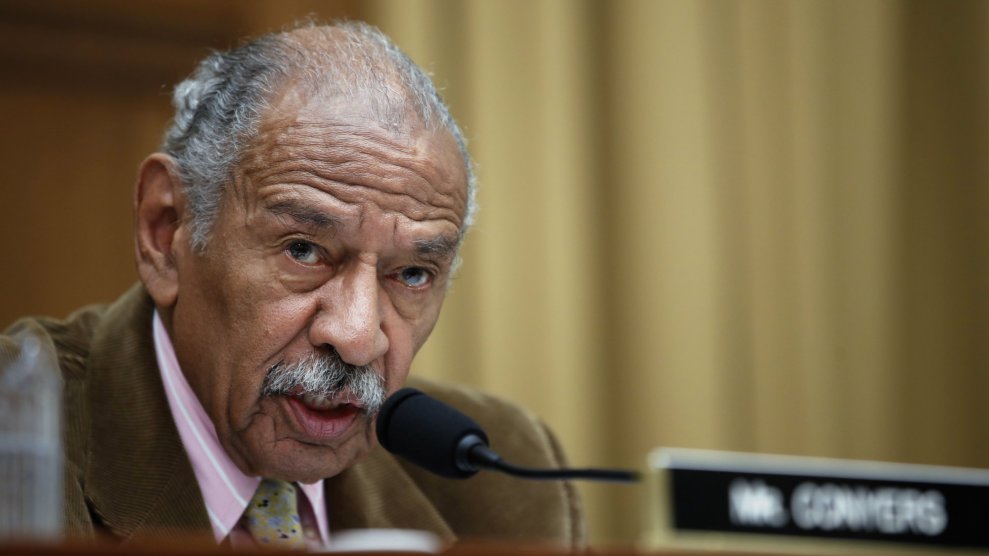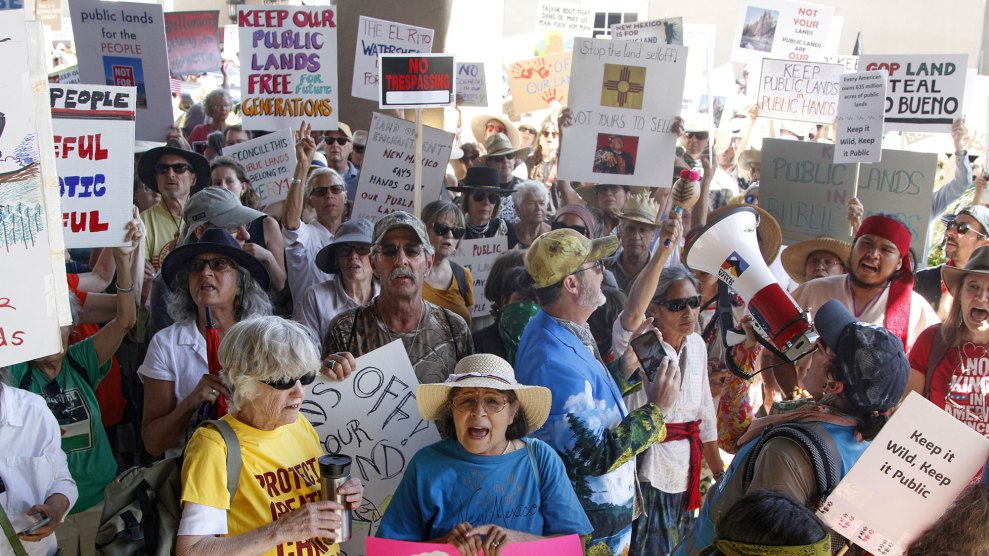
Marianne Williamson participates in the first of two Democratic presidential primary debates hosted by CNN, on July 30, 2019, in the Fox Theatre in Detroit.Paul Sancya/AP
For a brief and all-too-rare moment in American politics, the case for slavery reparations took center stage Tuesday night, and William Darity Jr. was thrilled. Darity is a public policy professor at Duke University and an acclaimed scholar on reparations, and for the first time in his life the idea of compensating the living Black descendants of American slaves was being discussed by people running for president—one of them, author and spiritual guru Marianne Williamson, actually working out the math onstage, in front of an audience of millions. “It was,” Darity told Mother Jones, “a fairly dramatic moment.”
.@marwilliamson: "People heal when there is some deep truth-telling. We need to recognize when it comes to the economic gap between Blacks and whites in America, it does come from a great injustice that has never been dealt with." https://t.co/WF6sVpBK0X pic.twitter.com/31w8jV12rt
— Mother Jones (@MotherJones) August 2, 2019
This happened during the first of the two Democratic presidential debates in Detroit. First, there was Beto O’Rourke, declaring his support for Rep. Sheila Jackson Lee’s legislation—HR 40, originally developed by former Rep. John Conyers—to launch a commission to study reparations. “The legacy of slavery and segregation and Jim Crow and suppression is alive and well in every aspect of the economy and in the country,” O’Rourke said.
And then came Williamson, arguing that the $200 billion to $500 billion she’s proposed for reparations wasn’t “financial assistance” but rather a “payment for a debt that is owed.”
We need some deep truth-telling when it comes [to reparations]. We don’t need another commission to look at evidence. I appreciate what Congressman O’Rourke has said. It is time for us to simply realize that this country will not heal. All that a country is, is a collection of people. People heal when there is some deep truth-telling. We need to recognize when it comes to the economic gap between Blacks and whites in America, it does come from a great injustice that has never been dealt with. That great injustice has had to do with the fact that there were 250 years of slavery followed by another hundred years of domestic terrorism.
What makes me qualified to say $200 [billion] to $500 billion? I’ll tell you what makes me qualified. If you did the math of the 40 acres and a mule, given that there were four to five million slaves at the end of the Civil War, and they were all promised 40 acres and a mule for every family of four—if you did the math today it would be trillions of dollars. And I believe anything less than $100 billion dollars is an insult, and I believe that $200 [billion] to $500 billion is politically feasible today because so many Americans realize there is an injustice that continues to form a toxicity underneath the surface and an emotional turbulence that only reparations will heal.
The moment was quickly overshadowed, but it was remarkable nonetheless: The idea of reparations was on the national agenda in a way it has not been since Reconstruction, by Darity’s reckoning. Williamson may have spoken the words that put it there, but her answer on Tuesday was built on the work of several generations of Black grassroots activists, not to mention the efforts of policy wonks like Darity.
Darity, co-author of a forthcoming book on reparations with Kirsten Mullen, spoke with Mother Jones on Wednesday about the long distance the issue of reparations has traveled, from Reconstruction and Callie House’s pension association all the way to Marianne Williamson and her psychic forces. We discussed the “courage” of Williamson and Julián Castro on reparations, the activism that kept the issue alive for years, and why he thinks the racial wealth gap is the best measure of the debt owed by the country to its Black citizens. The interview has been edited and condensed for clarity.
What did you make of Williamson’s comments on the debate stage this week?
I was really excited. She’s the first presidential candidate in my lifetime to explicitly say that she’s in favor of reparations for Black descendants of slaves in the United States. It was a fairly dramatic moment. She made overtures about that in the previous debate. But she was cut off by Kamala Harris’ switch to the issue of school desegregation and the confrontation with Biden.
When I [first] heard her take the position in support of reparations, I said to her the amount that she is projecting as the funds for reparations is far too small. But what she is communicating is excellent, especially her emphasis on the notion that this is a national debt for obligations that have not been met for more than 150 years.
Why was that particular emphasis on reparations as a national debt important to you?
So many people seem to take the claim for reparations as a personal affront or charged with individual guilt. By putting the focus on this as a national debt for obligations she shifts the terrain away from this notion that individual or any family is being charged with particular guilt over America’s history of racial injustice.
How does Williamson’s stance compare to other candidates on the issue of reparations?
The only other person who has come close to taking the position that she’s taking is Julián Castro. Other candidates have been at least moderately open to the idea of reparations and have endorsed HR 40—the legislation that’s under Sheila Jackson Lee’s office at the moment that was originally developed by John Conyers. It would establish a commission to assess reparations for native Black Americans and then design a program of restitution.
That’s a positive also, although I appreciate the greater degree of forthrightness from both Marianne Williamson and Julián Castro in saying that they explicitly endorse a comprehensive program of reparations and would take steps to try to make that happen. Those are the two candidates who’ve displayed the greatest degree of courage on this issue because it is politically risky to say that you’re in favor of reparations at this moment in time. They believe reparations is the right thing to do. [They’re] not simply putting their fingers in the wind.
The existence of a commission to assess reparations is a valuable step in the process. It would be parallel to the reparations program for Japanese Americans who were unjustly incarcerated in World War II. But Bernie Sanders and other candidates have not said that they would view an important charge for the commission to actually design a reparations program and that they would endorse such a reparations program. What makes advocates of reparations nervous about their position is that I think they would be perfectly content with a commission outcome that said that the reparations program was not appropriate or not take us very far toward eliminating the wealth gap, which is a central purpose of a reparations program.
Why is it politically risky to say that you’re in favor of reparations?
Because only about 20 percent of white Americans indicated they are in favor of reparations. So by taking a stand in favor of reparations, you are also taking a stand that indicates that you have to persuade a significant number of Americans both white and Black, that this is the right thing to do.
You had mentioned at the start that Marianne Williamson was the first presidential candidate in your lifetime to explicitly say she was for reparations—I guess I’m baffled that we’re talking about this at the presidential debate.
I’m surprised myself. Believe me [laughs].
How has it popped up in the past?
I don’t think that there’s been a point in which national candidates for the presidency of the United States have explicitly talked about reparations. The way reparations have emerged as a topic has been through grassroots efforts in the Black community to promote programs. But they have never had the kind of attention at the national level that currently is occurring, at least not since the Reconstruction era, when the promise was made of 40-acre land grants to the formerly enslaved and that promise was not fulfilled. That’s why we’re having the conversation now about reparations, because it was a foundational moment for the enormous wealth disparity that we now observe between Black and white Americans.
Who was it that brought it up during Reconstruction?
It was the so-called Radical Republicans, who wanted to make sure that there was actually a form of restitution and foundation for asset building that was held by the core advocates of the land grant. But they also wanted to ensure that Black male voters could actually exercise the vote, and none of that happened. To the extent that it happened, it was temporary, for a period of about five to seven years.
What changed regarding the attention reparations has gotten?
I’m not sure that I have a really good explanation. But I’m pleasantly surprised.
There’s a long history of activists within the Black community making the reparations claim. There’s a somewhat obscure case that I’m just learning about now on a person named John Wayne Niles, who created what he called the Indemnity Party in the 1880s. He made a reparations claim that was predicated on obtaining land grants that was put into a petition, which was actually put forward by William T. Sherman’s brother John when he was in the Senate from Ohio. The petition was ultimately tabled, so no serious attention was given to it. The most significant 19th-century movement for reparations was led by a woman named Callie House, who cleaned laundry in Tennessee. It was a movement for pension funds for the formerly enslaved, and I think obtained as many as 300,000 signatures from formerly enslaved individuals to support her petition. She was far more successful in building a movement than Niles was. But the powers that be were very disturbed by the success of her movement. They brought her down by using mail fraud charges, the same type of charges used to bring down Marcus Garvey when his movement was gaining momentum.
It’s my understanding from Mary Frances Berry‘s work that former members of Callie House’s movement were instrumental in the development of the Garvey movement. And one of the prongs of the Garvey movement was reparations for Black American descendants of the persons who were slaves in the United States.
Subsequent to that, there was a smaller movement that was led by a woman named Queen Mother Audley Moore. Her efforts were the basis of organizations like in N’COBRA, the National Coalition of Blacks for Reparations in America. That’s the organization that was most involved with John Conyers and the development of HR 40, circa 1989.
There’s a rise in interest in reparations on college campuses primarily at the end of the 20th century. But this gets shut down. There was a surge in interest in reparations, but everything was silent after 9/11, and there was no real significant attention drawn to reparations until 2014, when Ta-Nehisi Coates publishes an article in the Atlantic called “The Case for Reparations.” After that, you have a renewed surge of interest, particularly a surge in interest and activism that has occurred in social media, led by Yvette Carnell and Antonio Moore, who have promoted the ADOS movement (American Descendants of Slavery).
Conyers introduced the bill for 30 consecutive years without it actually getting to the stage of emerging from the judiciary committee. It was actually an important moment when Rep. Sheila Jackson Lee managed to have hearings on the bill [in June]. N’COBRA was important from the standpoint of keeping the message alive, but they did not have much of a national impact. That’s one of the reasons the bill remained cloistered for so many years.
Where was that group’s influence felt?
There are sections of the Black American population who have always maintained that redress is merited. N’COBRA’s presence kept the fire alive for those segments of the Black American population. Now, that’s not a majority of Black Americans, even though I think a majority of Black Americans do indicate that they’re in favor of reparations, but the activist element has always been somewhat smaller.
Another part of the Williamson moment that stood out was that she gave a number: between $200 billion and $500 billion. You had mentioned that’s low. Why do you think that’s the case?
There’s a number of ways of looking at this. One way is to look at what would be required to eliminate the racial wealth gap—what would be required to give Black Americans the same share of the nation’s wealth that corresponds to our share of the nation’s population. And that would be a figure in the vicinity of $10 trillion to $12 trillion.
Another route toward calculating the reparations bill is to partition off the injustices. So you could do a monetary computation of the injustices associated with slavery, the injustices associated with a period of Jim Crow, including legal segregation with respect to residences, with respect to education, with respect to employment discrimination. You can also monetize out the dimensions of American racism that have been associated with the post–Civil Rights period, manifest in police executions of unarmed Blacks, the costs associated with mass incarceration of Black Americans, ongoing employment discrimination, as well as the immense racial gulf in wealth. If you go that route, if you add up all of these pieces, you come up with a figure that’s closer to $17 trillion.
I’m very glad to see Marianne Williamson take a bold stand in favor of reparations, but the monetary amount that she’s proposing is extremely low. Originally, she said $100 billion. And I think I made the comment at some point that that was paltry. She actually engaged in a conversation with me about it. And then she changed the figures [to be] in the $200 billion to $500 billion range. I do want to give her credit with modifying her original number. And I have the sense that, if so advised, she would be responsive to altering the current figures that she’s offering.
Have you been in touch with campaigns about this stuff, to consult?
The answer is yes but I’m not able to let you know exactly whom.
Okay. Walk me through how the amount for reparations was determined in the past versus today.
The first studies I saw where these calculations were made were primarily focused on reparations as restitution for the damages of slavery, and those were frequently calculated by treating enslaved people as producing unpaid labor. An attempt was made to calculate what the amount of pay would have been received had they been free labor. The way that was typically done was to look at what the wage rate was for free labor, and then assign that wage rate to the corresponding amount of time that enslaved labor had to surrender to the slaveholders.
At around the same time, there were also people who were trying to estimate loss in wages Black Americans have experienced as a consequence of discrimination in labor markets. And then I introduced another procedure, which was to say, let’s consider what the present value is of the 40-acre land grants that were never actually distributed—or when they were distributed, they were taken back and restored to the former slaveholders. That’s another route to coming up with a calculation.
But I’ve come to settle increasingly on thinking about what would be required to eliminate America’s racial wealth gap.
Why did you shift to that?
Because I think what we must be looking at are the cumulative effects of America’s racial history of injustice on currently living Black American descendants of slaves. And I think that that cumulative effect is captured best financially by the immense differential in wealth that’s held by Black and white Americans. The average differential for Black and white households is approximately $800,000. So that’s the gap that I think needs to be bridged and is probably best bridged by a reparations program.
Warren and Sanders have approached addressing the racial wealth gap by essentially saying, “We need to restructure how society works.” But they don’t explicitly say reparations are the way to close that gap.
It’s absolutely true that we need to make structural changes in America. I don’t see that as mutually exclusive from a reparations program. But I will say this: All of the policies that they have advanced, taken separately or taken collectively, will not close the racial wealth gap. In fact, at best it will take us one-third of the way towards closing the racial wealth gap.
Why wouldn’t they take us all the way to closing the racial wealth gap?
Because I’ve run the numbers and they won’t [laughs].
After these two debates, the field onstage is going to shrink. Do you think this issue of reparations will continue to come up going forward?
It will be a consequence of efforts of folks within the Black community to continue to promote a Black agenda, which would be inclusive of reparations. If the field narrows with candidates who have not made such a commitment or have been somewhat wishy-washy about it, the question remains: What kind of pressure will they receive from the Black American constituency to pay attention to this issue? I’m hopeful that that pressure will continue to be applied but I don’t know what will actually happen.

















